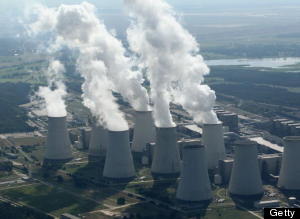STOCKHOLM -- The World Bank says it will increasingly view its efforts to help developing countries fight poverty through a "climate lens."
In a report released Wednesday, the international lending institution warned that heat waves, rising seas, more severe storms and other impacts of climate change will trap millions of people in poverty.
As a result, the Washington-based bank said it is stepping up support for efforts to curb climate change and to help the world adapt to it.
"Urgent action is needed to not only reduce greenhouse gas emissions, but also to help countries prepare for a world of dramatic climate change and weather extremes," World Bank President Jim Yong Kim said in a statement.
Already by the 2030s, 40 percent of the land used to grow maize in sub-Saharan Africa will be unable to sustain that crop because of droughts and heat, the report said. Also by that time, sea level rise coupled with more intense cyclones could inundate much of Thailand's capital, Bangkok, it said.
"At the World Bank Group, we are concerned that unless the world takes bold action now, a disastrously warming planet threatens to put prosperity out of reach of millions and roll back decades of development," Kim said. "In response we are stepping up our mitigation, adaptation, and disaster risk management work, and will increasingly look at all our business through a `climate lens.'"
In a conference call, bank Vice President Rachel Kyte said the World Bank doubled its lending aimed at adaptation efforts to $4.6 billion in 2012.
She said that money was separate from the adaptation funds transferred from rich to poor countries in U.N. climate talks. The developed countries have pledged to ramp that financing up to $100 billion annually by 2020. Critics say that won't be enough, pointing to the New York's recently announced $20 billion plan – for that city alone – to stave off rising seas with flood gates, levees and other defenses.
Aid groups and climate activists welcomed the report, which was launched in London and prepared for the World Bank by the Potsdam Institute for Climate Impact Research and Climate Analytics, both based in Germany.
"The World Bank must go beyond ringing the alarm bell," said Sasanka Thilakasiri, of British charity Oxfam. "It must ensure its own lending meets the needs of the people who are most vulnerable to climate change."
Original Article
Source: huffingtonpost.com
Author: AP
In a report released Wednesday, the international lending institution warned that heat waves, rising seas, more severe storms and other impacts of climate change will trap millions of people in poverty.
As a result, the Washington-based bank said it is stepping up support for efforts to curb climate change and to help the world adapt to it.
"Urgent action is needed to not only reduce greenhouse gas emissions, but also to help countries prepare for a world of dramatic climate change and weather extremes," World Bank President Jim Yong Kim said in a statement.
Already by the 2030s, 40 percent of the land used to grow maize in sub-Saharan Africa will be unable to sustain that crop because of droughts and heat, the report said. Also by that time, sea level rise coupled with more intense cyclones could inundate much of Thailand's capital, Bangkok, it said.
"At the World Bank Group, we are concerned that unless the world takes bold action now, a disastrously warming planet threatens to put prosperity out of reach of millions and roll back decades of development," Kim said. "In response we are stepping up our mitigation, adaptation, and disaster risk management work, and will increasingly look at all our business through a `climate lens.'"
In a conference call, bank Vice President Rachel Kyte said the World Bank doubled its lending aimed at adaptation efforts to $4.6 billion in 2012.
She said that money was separate from the adaptation funds transferred from rich to poor countries in U.N. climate talks. The developed countries have pledged to ramp that financing up to $100 billion annually by 2020. Critics say that won't be enough, pointing to the New York's recently announced $20 billion plan – for that city alone – to stave off rising seas with flood gates, levees and other defenses.
Aid groups and climate activists welcomed the report, which was launched in London and prepared for the World Bank by the Potsdam Institute for Climate Impact Research and Climate Analytics, both based in Germany.
"The World Bank must go beyond ringing the alarm bell," said Sasanka Thilakasiri, of British charity Oxfam. "It must ensure its own lending meets the needs of the people who are most vulnerable to climate change."
Original Article
Source: huffingtonpost.com
Author: AP

No comments:
Post a Comment